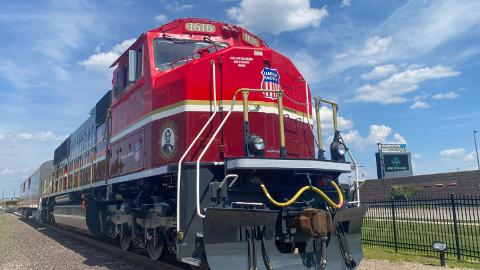Employees who become part owners of the company they work for undergo a mindset change about their role in its success.
Employee ownership has been shown to improve engagement, because it requires workers to reframe their perception of the "why" behind the company's actions. A higher level of engagement leads to motivated and happier employees, which leads to safer operations and better service. High levels of workforce engagement are necessary "table stakes" that enable a company to respond to a changing competitive landscape.
That’s part of the reason Union Pacific is implementing its Employee Stock Purchase Plan (ESPP). Approved by shareholders May 13, the plan represents a compelling new tool in the company’s engagement toolbox. ESPP will enable all active UP employees to become company owners, which more closely aligns their interests with the company’s long-term success.
It’s more than just a perk. In addition to receiving wages, employees can build additional wealth by taking part in the company’s upside. One of my Finance professors used to preach that the best way for employees to develop personal wealth was through equity holdings in their companies. As owners, employees will have a vested personal interest in seeing the company prosper because they will benefit directly from dividend payments and value appreciation over time.
The ESPP is yet another reflection of how this 160-year-old business has changed over just the past few years. Sure, our basic operating model hasn’t shifted materially since the company completed the Transcontinental Railroad. We still move rail cars from point A to B.
But before the onset of the pandemic, companies began thinking differently about the supply chain. Amazon’s free next-day shipping is conditioning consumers to expect greater transparency and efficiency regarding their packages. Around the same time, the U.S. rail industry began implementing precision scheduled railroading (PSR) principles to improve network efficiency and be more responsive to changing consumer demand.
Subscribe to Inside Track
Over the last couple of years, UP has made significant improvements in productivity under the mantle of PSR. Rail cars move faster, assets are more productive, and our network is more resilient because of those improvements. Arguably, PSR principles haven’t really changed the levers that drive efficiency – lean operations are still lean operations after all. But they have challenged the way our operating managers think about productivity, which has been a powerful change agent.
Changes in the mindset of our general workforce also are required if our company is to remain competitive in a future of automated trucks, additive manufacturing, and service levels tailored to customer demand. And that can be a challenge for a mature company in a mature industry. “The way we’ve always done it" introduces tremendous inertia in the company’s workforce. Changing the mindset of the workforce requires new ways to engage employee in the long-term success of the company.
UP’s decision to offer an ESPP is a sign of the changes occurring in the rail industry. It embodies our Serve Grow Win Together strategy by aligning stakeholder interests in the long-term success of the company. I am excited about what we will accomplish with higher levels of employee engagement aligned around the same objectives. Such alignment will ensure we continue Building America long into the future.
*The lawyer in me requires at least one disclaimer. Keep in mind that this blog post is not intended as investment advice. Employees should consult their financial advisors to determine whether it makes sense to participate in the program.







